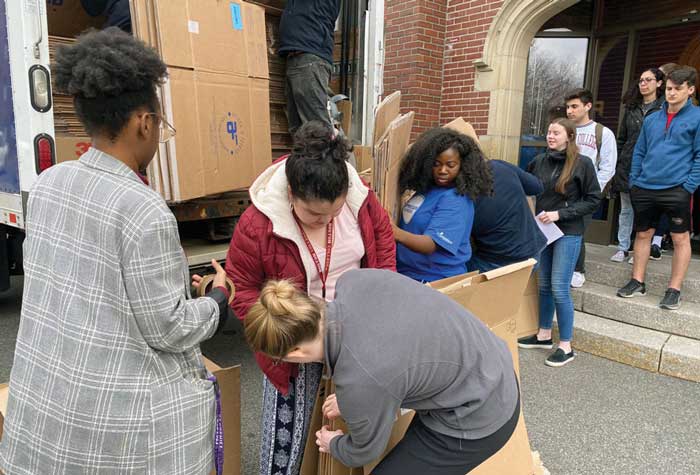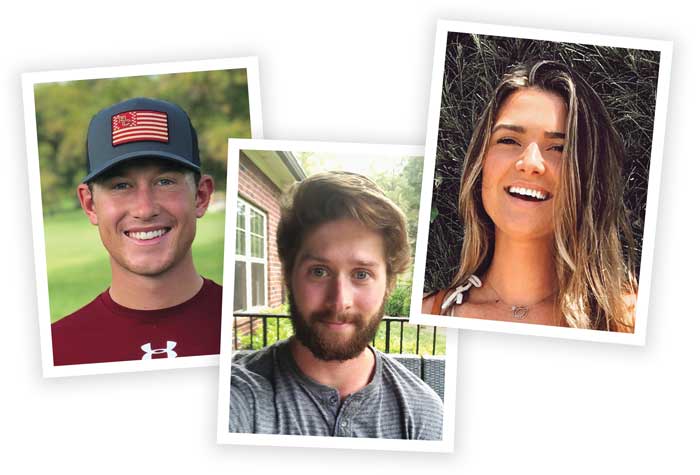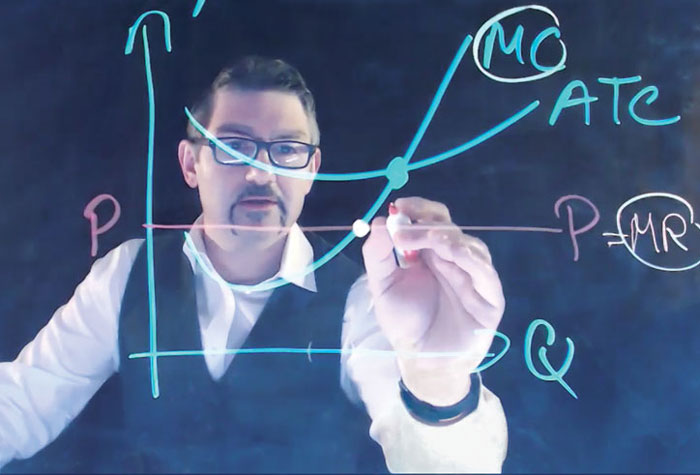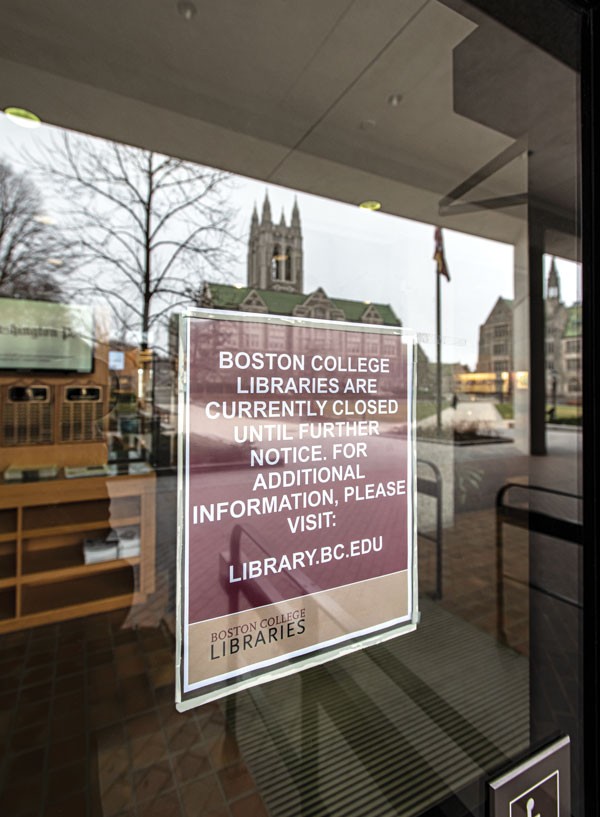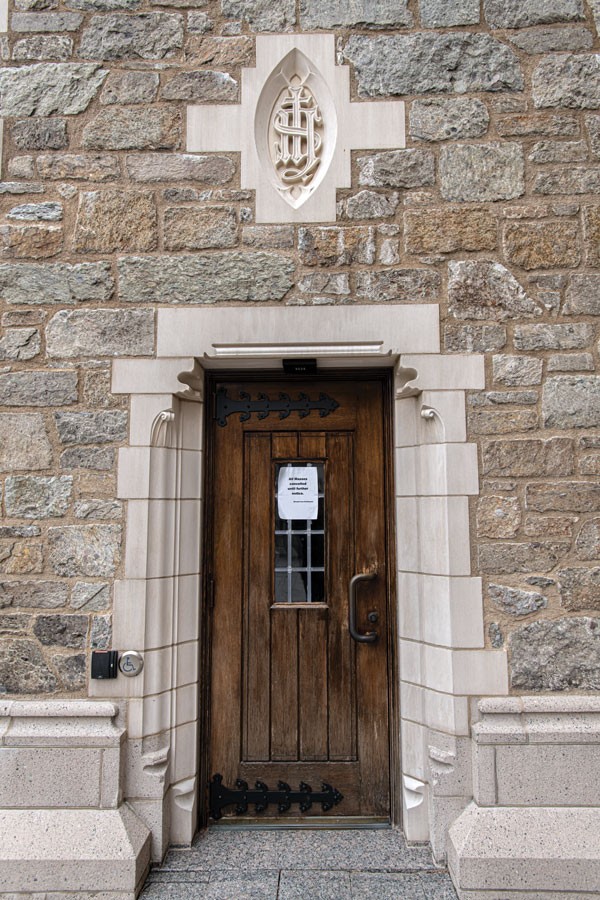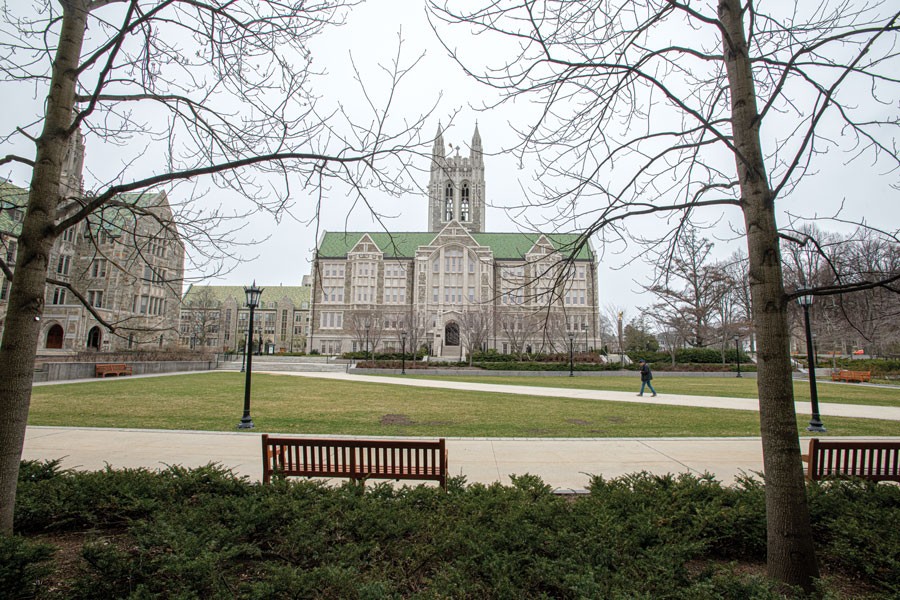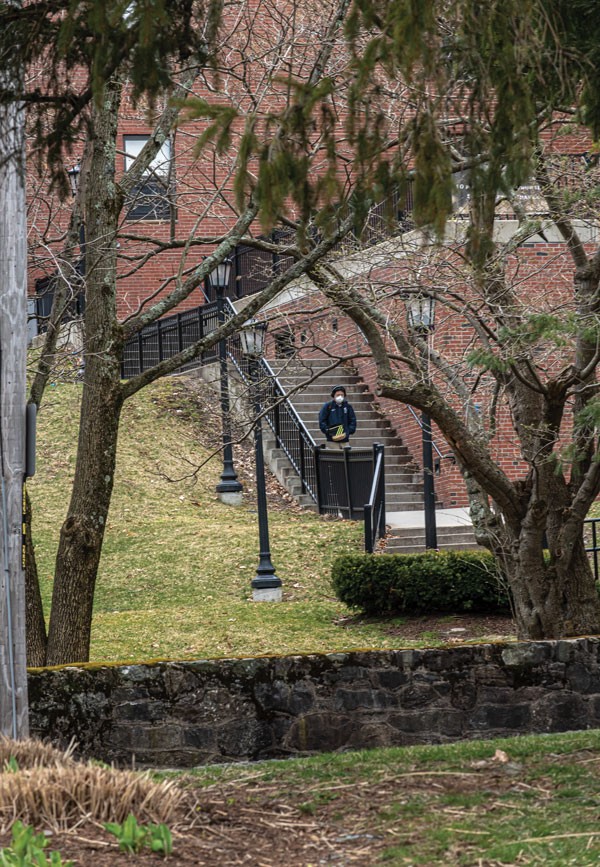Photo: Lee Pellegrini
More Than Ever to Excel
Socially distant and spread around the world, the BC community stands as one.
MORE: Continuing Education // Endgame // Moving Out: An Oral History
It was a Wednesday—March 11—when the email arrived. Boston College President William P. Leahy, SJ, was writing to inform the BC community that, in response to the Covid-19 pandemic, students would have to return home, nearly all residence halls would be closed, and classes would be moved online. By Sunday night, a campus buzzing with early spring excitement had gone eerily still. To document this extraordinary moment in BC history, we commissioned a series of personal reflections—complete with selfie photos—from across the University. Ahead, students, parents, academics, and administrators share their thoughts and emotions about the conclusion of a semester beyond anyone’s imagining. They describe the confusion and worry you might expect, but also a pride in how BC has responded to the pandemic and remained united throughout it. Most of all there is optimism, a belief that the University will emerge from the crisis stronger and more committed to its mission than ever.
OUR COLLECTIVE FAITH IN THE FUTURE
................
David Quigley
Provost and Dean of Faculties
March 18–19, 2020
Late Wednesday afternoon. We’re approaching one week since the University announced that remote instruction would commence on Thursday morning, March 19—St. Joseph’s Day and memories of zeppole, for those of us with Southern Italian ancestry. For the first time in Boston College’s 157-year history, the University’s faculty and students together would engage via Zoom and Google Hangouts and various other technologies that Fr. McElroy could never have imagined.

The past seven days have been reminiscent of my first as interim dean of what is now the Morrissey College of Arts and Sciences. I took the reins on the morning of September 22, 2008, as the world financial collapse accelerated. Not that I have many clear memories of the whirlwind of that fall semester, but I didn’t come up for air until months later, when a strange new world awaited all of us. These late-winter days have had the same mix of endless work and worrying, inspiring examples of selfless sacrifice and intensifying dread all around us.
As a historian, I’ve been looking back at nineteenth-century and other past voices for solace, inspiration, and humor. Long-ago presidents and crisis-era professors, morning-of-battle generals and self-sacrificing health professionals—I’m looking far and wide for words of wisdom and sustenance. The turn to the past that resonated most powerfully over these days was MCA&S Dean Kalscheur’s email to his faculty colleagues in which he quoted his fellow Jesuit Matt Carnes writing about the first Jesuits as a “communitas ad dispersionem”—a community in dispersion. The decades-long sixteenth-century correspondence between St. Ignatius in Rome and St. Francis Xavier in Asia also comes to mind, with Ignatius once concluding from across the globe: “without power or possibility of ever forgetting you.” As I conclude my twenty-second year at Boston College, I never could have imagined that we’d become in our own global, interconnected age a communitas ad dispersionem.
I’m working into the evening hours on Wednesday here in Waul House with Vice Provosts Akua Sarr and Billy Soo as we finalize and announce the various academic policy modifications that deans and academic administrators and faculty have helped shape over the previous days. I step away for the better part of an hour for a pandemic webinar with Ron Klain of the investment firm Revolution, who was at one point the Ebola czar for President Obama. Klain provides a range of sobering data and I then run back to finalize our academic policy memos. I leave the office to head to a near-empty Logan Airport to pick up my middle son, Tyrone, who is returning from his winter term at Carleton College in Minnesota. We’re glad to get home to Cambridge as we remark on the eerie feeling at Terminal A baggage claim and a deepening sense that this will be our last visit to Logan for some time.
The past seven days have been among the busiest in my career. Daily Zoom meetings with the Council of Deans and other University colleagues. Hundreds of student and faculty and parent emails. Phone calls with colleagues and other friends whose spouses or kids or loved ones are being tested for Covid-19. Further adding to the busyness of the week is the long-scheduled online notification of admitted students for the undergraduate Class of 2024. And tomorrow, we’ll commence with remote instruction. A once-in-a-generation test of our information technology systems will play out in real time across the next twenty-four hours.
I wake on Thursday morning with intense anticipation for the start of classes at 8 a.m. I’m in Waul House soon after 7 and begin monitoring emails and phone calls. I spend the morning checking in with colleagues across campus and around the world. There are encouraging reports from some deans and department chairs about the rollout of online instruction, but I resist the urge to overinterpret these early data points. A sudden onset of quiet for the midday hour leaves me unsettled. What could the silence mean? Good news? Something gone wrong? The day concludes with generally reassuring news, though I know well that I’ll continue tracking our progress for each of the remaining twenty-six days of instruction this semester, all the way until the last class ends on the evening of April 30.
Our daily 3 p.m. Zoom meeting with the Council of Deans concludes with Connell School of Nursing Dean Susan Gennaro holding her two-year-old grandson, Randall, on her lap. Young Randall wants to connect with the various deans and vice provosts arrayed on his grandmother’s desktop screen. A welcome and hopeful reminder of our community’s collective faith in the future.
A COMMUNITY IN DISPERSION
................
Greg Kalscheur, SJ
Dean of the Morrissey College of Arts and Sciences
At the end of the tumultuous week when the University decided to send students home and transition to remote teaching and learning for the rest of the semester, I was writing an email to the Morrissey College department chairs to thank them for their leadership in helping their colleagues quickly transition to online teaching. As I worked, I found myself choking up as I anticipated students (who were still on campus at the time), especially seniors, getting ready to move out and head home, and as I thought about colleagues leaving campus to work remotely. I concluded my email with these words:

One final reflection on our current situation: We are necessarily hearing more about “social distancing” at the moment. While physical distancing is indeed a critical public health measure to limit further spread of the coronavirus, I am convinced that we must work together to maintain our social connections as a community. I was given great hope by this message, which was posted on Twitter last week by Matthew Carnes, SJ, a fellow Jesuit who teaches in the Government Department at Georgetown University:
As many Jesuit universities transition to online courses, I am reminded of the way St. Ignatius and the first companions saw themselves as a “communitas ad dispersionem,” a community in dispersion. They felt themselves drawn together by a shared life and mission, and they had discovered true joy in each other’s company. But when the needs of the times—both opportunities and challenges—required them to be scattered across the globe, they went. Through it all, they remained intimately connected through the technology of their day—letters carefully crafted and shared—so that each continued to feel united with all the others. Still one community, still one mission, still one life. I am heartened already to see my friends and colleagues and students embracing this moment in something of the same spirit. Caring for and inspiring one another as we face challenges. Separated, to be sure, but still united. Still a community.
That strikes me as very much the right attitude of heart and mind for all of us to have as we move forward together. In that spirit of striving to embrace this moment by using the available technology to remain united with one another as a community despite being physically separated and dispersed around the country and around the world, I am confident that we can, like St. Ignatius and the first Jesuits, endeavor to live as a true community in dispersion. That is my hope for the entire Boston College community.
GETTING THROUGH IT TOGETHER
................
Beatriz Day P’23
Parent of Rising Sophomore Annabel Day
Our daughter is Annabel Day, and she just finished her freshman year. The week before spring break, Annabel was on an Appa Volunteers trip—she went to North Carolina. She’d been looking forward to it all year, so it was a very exciting and moving experience for her. Not long after the group got back, the emails started coming from the University saying they were watching the coronavirus situation. Then, on March 12, it was midnight, I got a text from Annabel saying, “Classes are moving online. We’re being asked to leave school and we’ve got until Sunday.” We live in a suburb of London called Sevenoaks, and the first thing I did was book a flight—our worry was that flights were going to stop.

Annabel packed up all her things, put them in storage, and got herself to the airport. That was on Saturday, and once she texted that she was at the gate, that’s when I thought, Okay, it’s going to be fine.
It’s been an interesting worldwide experiment with online learning. Because of the time difference, it’s difficult, but it’s been fine. Annabel still does her classes. She still does her homework and submits her assignments. She’s taken over my little study—she puts up a sign that says “In Class,” because she gets embarrassed when we walk in.
It’s been really important for us to see the support from the professors. They’re going through this too, and they’ve got their families to worry about, and they’re the ones that are responsible for delivering the lessons. So, it’s been really wonderful to see how they’ve all been empathetic and creative and open. Obviously, the learning is important, but it’s more about us as a community saying we can get through this together. And getting through this together is almost more of a learning experience than the actual course work.
SOCIAL DISTANCING WITH THE JESUITS
................
Oliver P. Rafferty, SJ
Professor of History
The coronavirus has upended much of the world as we know it, but the life of the Jesuit community at St. Mary’s Hall has not changed much during the pandemic. St. Mary’s on Linden Lane has, since 1917, been the community home of the Jesuits who serve Boston College as professors or administrators. It also houses some younger Jesuits who are studying at the University.

Jesuits tend to live highly individual lives. Unlike monastic communities, we do not come together daily as a full community to celebrate the Divine Office and the Eucharist. From that viewpoint little has changed. Mass is said privately or in small groups, and members of the community tend to pray in their rooms. The weekly community Mass on Friday followed by a social has been canceled for the time being. At an early stage we closed our community refectory to visitors. As for the chapel, we waited until the Archdiocese of Boston ordered all public services to be suspended before canceling our Masses, three on weekdays and one each on Saturday and Sunday during semesters.
The biggest changes have come in our eating arrangements. The need to keep “social distance” in the dining room has proven a bit difficult. Initially, we sat two or three to a table, but for the most part we now sit alone. We have not been greatly inconvenienced—our staff still come in to cook our food and to clean the common areas of St. Mary’s—and we are conscious that in a sense we live very privileged lives. And so one’s thoughts turn to those who are suffering and are frightened in this time of blight.
The greatest change for me has been the stay-at-home advisory issued by the governor of Massachusetts. I tend to work in my office most days. Now, having to do everything in my room, including teach via Panopto, has been something of a challenge. I get reports from former students that they are well, which is encouraging, and from my family and friends in Ireland that they are coping.
I am struck by how the crisis has brought out the best and worst in us as human beings. Tales of self-sacrifice and generosity on the part of many gladden the heart. It is astonishing how some, however, are using the pandemic for personal gain. Our politicians rarely display true devotion to the interests of the common good, and I fear that has been true this time. They could lead by donating their campaign war chests to hospitals and medical charities. John F. Kennedy once said, “Ask not what your country can do for you, ask what you can do for your country.” We could all benefit by acting on those sentiments.
GRATITUDE FOR EACH DAY
................
Joy Moore ’81
Vice President for Student Affairs
From the moment students learned they’d need to vacate the campus, they’ve had a great many emotions. It was around 5 p.m. when the email came, and I was just starting a dinner meeting with the Asian Caucus student group. The students were checking their phones, as they often do, and suddenly they started to look around at one another in disbelief. Then a few started to cry as it began to sink in that they would be leaving for the remainder of the school year, not just for a period of time. I wrapped up the dinner meeting, as I knew the students needed to go and be with their friends.

The escalation of the pandemic and how quickly we had to respond and build multiple contingency plans challenged us all in many ways. We began to receive a flood of phone calls, emails, and text messages from students and parents. They had questions and suggestions, and I made it a division priority to respond to all of their inquiries as quickly as possible. As a parent myself, I could relate to the uncertainty, anxiety, and frustration many parents felt, particularly during the first few weeks of this pandemic. So, as always, our division tried to be accessible and transparent in how we communicated. Showing strength and empathy along with a certain amount of vulnerability is an authentic and honest way for me to communicate.
Looking ahead, we’re confronted with a lot of unknowns, and just being present and accepting of this new reality is step one. We’re all experiencing a disruption in our daily routines and we very much want to get back to what feels normal and comfortable. Yet, we must practice patience and know that we are doing the right thing for the greater good. We need to be kind to each other as we navigate this temporary new normal we find ourselves living in, and keep our spirits up and remind ourselves of what we are grateful for each day.
STRENGTH, RESILIENCE, AND CREATIVITY
................
Shakalah Thompson ’21
Martin Luther King, Jr. Scholarship Award Winner
When I was taught how to swim in the ocean, I learned that when fighting a rip tide, it’s best not to fight at all. That will only tire you out. It’s best to hold your breath and let the tide take you until you are up above water again. The Covid-19 pandemic is its own kind of rip tide, one that has swept us all out and away from feelings of normalcy and groundedness, and I have been doing my best not to fight it.
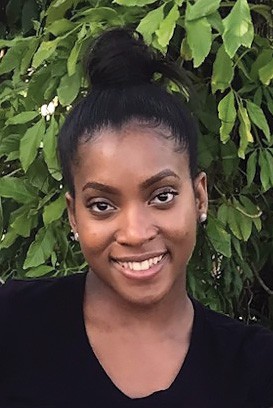
When the email arrived in March announcing that students would have to leave campus because of the pandemic, I didn’t really have the time to process moving out: I just knew that the remaining months I thought I was going to have with my friends, my pending internship opportunities, my plans to go abroad in the summer, the events my e-board had planned for our outreach program, any semblance of progress I had made in the past few months—they were all gone with one email.
But there was something else that was filling, and clouding, my mind during the three days I took to move out. That would be thoughts of students who were unable to return home, who had nowhere to go, nowhere to store their belongings, or who would not have access to the resources that they needed to finish the school year. I thought about the fact that not every student had parents who could come and help them transition out. Not everyone had access to food and shelter outside of the University’s housing, or could afford an unplanned bus or plane ticket. As I packed, I wondered if these students were being accommodated, especially considering we were expected to continue school online just the following week. It was heartbreaking to consider that our most underprivileged students might find themselves holding an even shorter end of the stick. [To learn how BC accommodated students who were unable to return home, see Moving Out: An Oral History.]
As for the transition to online classes, I appreciated the professors who were generous about restructuring their syllabi in ways that were inclusive of students who may not have had the material or mental resources to go about their schooling as normal. And if we ever find ourselves in this situation again, I would encourage all professors to continue to assess and reassess their classroom priorities given the realities their students will be facing.
The transition for me was not easy, but I was determined to keep a positive approach. My mother always told me you cannot control the circumstances that life throws at you, only how you respond. Having strength, resilience, and creativity is important now, more than ever, in order to cope with the difficulties and uncertainties many of us have to face. So rather than drown in despair, I choose to wear my faith as a life jacket that carries me through rough waters—even a rip tide.
NEW CREATIVE PATHWAYS
................
Christopher Boucher
English Department Associate Professor of the Practice
One of my favorite literary movements, the French group of writers and mathematicians known as the OuLiPo (the Ouvroir de Littérature Potentielle), was founded on the notion that constraints—the challenge, say, of writing a lipogrammatic novel that omits a given letter and any words that include it—can lead to new creative pathways or epiphanies. I’ve been thinking about this idea frequently since the Boston College community transitioned to online learning in mid-March.

Teaching at BC is one of the great privileges of my life, and I won’t ever forget the sinking sadness I felt the day the online transition was announced. As I walked from my office in Stokes to the Commonwealth Garage that Wednesday night, I remember reflecting on all that we would miss over the next two months: the vibrancy of campus as the spring flowers bloom, the electric charge of Arts Fest, the triumphant Honor’s Tea held by the English department every May.... The list goes on.
In the days that followed, though, I reviewed my coursework in search of moments where these new constraints might yield new opportunities. In my fiction workshop, for example, I modified an assignment to give students the option of creating a video presentation or podcast instead of an essay. I also developed a virtual tour to replace the physical one that I usually lead for students in my one-credit seminar Walking Infinite Jest. As the title suggests, this course invites students to read David Foster Wallace’s opus—much of which takes place just down the road from campus—while visiting the landmarks that inspired it.
I’ve heard tell of such modifications from a number of colleagues, and it was heartening to see the BC community respond with ingenuity and fortitude to the constraints presented by online learning. Still, I found myself missing BC—both in the ways I expected and in some I wouldn’t have considered a month earlier. Starting a Zoom meeting in my home office, I missed walking toward my class meetings through hallways filled with the faint chatter of five or ten other classes in session. Addressing the grid of faces in my online classroom, I looked forward to a time when I could jot down notes on a real blackboard again, or ask a question and see five or six hands in the room shoot into the air.
A virtual tour, finally, is no match for the full-sensory experience of a walk—nor for that unforgettable moment a few years ago, during an earlier iteration of Walking Infinite Jest, when my students and I were reading aloud on a Cambridge street corner and a man stepped out of an adjacent restaurant to take out the trash, saw the books we were all holding, and said, “Infinite Jest! I know that book.” Then he offhandedly mentioned one of the character’s names, and told us that the real-life inspiration for that character used to frequent his establishment. “I used to see him here all the time,” he said, and walked back inside. My students and I just stood there for a moment—aghast, delighted, and keenly aware that, sometimes, you’re blessed with the good fortune to be standing at the exact right place at just the right time. ◽


 print
print mail
mail